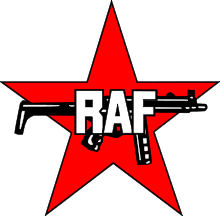Verena Becker
| Verena Becker | |
|---|---|
| Born |
July 31, 1952 Berlin-Wilmersdorf, West Germany |
| Organization | Movement 2 June, Red Army Faction |
Verena Becker (born 31 July 1952 in Berlin-Wilmersdorf) was a West German member of the Movement 2 June and later the Red Army Faction.
Terrorist career
Before turning to a life of crime, Becker was a student. She initially joined Movement 2 June (J2M) and was involved in bank robberies[1] and the bombing of a British yacht club in West Berlin on 2 February 1972. J2M claimed this bombing was in support of the Provisional Irish Republican Army (IRA). Becker was subsequently arrested and on 13 February 1974 she was tried and found guilty of involvement in the bombing. She was sentenced to six years in prison; a year later, she was freed and flown to Aden Southern Yemen as part of the exchange deal proposed by the Peter Lorenz kidnappers.[2]
At some point between 1975 and 1976, Becker returned to West Germany. She became involved in the second generation RAF re-grouped around Siegfried Haag, and it is likely that she came in contact with him whilst in Yemen, as he was there at the same time.
Arrest
In Singen, May 1977, Becker and fellow terrorist Günter Sonnenberg were spotted by police. Alarmed, Becker and Sonnenberg tried to flee. A gunfight ensued which left two police officers badly wounded. Sonnenberg and Becker attempted to drive off in a stolen vehicle, only to drive into a dead-end street. They abandoned the vehicle and ran, but were shot down and arrested. Sonnenberg was seriously injured by a gunshot wound to the head, and Becker was shot in the leg. A submachine gun was found in their abandoned car. It turned out to be the gun used to assassinate Chief Federal Prosecutor Siegfried Buback.[2]
Imprisonment
In late 1977 Becker was sentenced to life imprisonment[3] for her involvement in a criminal organisation. In prison she took part in hunger strikes for which she had to be force-fed.[4]
She was released from prison in 1989 after being pardoned by Federal President Richard von Weizsäcker.[1] She lived anonymously in Germany, under an assumed name.
Assassination of Siegfried Buback and rearrest
On April 7, 1977, Siegfried Buback, then the chief federal prosecutor for the Bundesgerichtshof, was shot by members of the RAF while travelling from his home in Neureut to the Bundesgerichtshof in Karlsruhe; while Buback's Mercedes was stopped at a traffic light a motorcycle pulled alongside and the passenger on the rear of the motorcycle opened fire with an automatic weapon at the vehicle. There is some evidence[5] suggesting that Becker took part in the assassination of Buback, though she herself claims Stefan Wisniewski was the one who killed him. DNA evidence however indicates that Becker probably did not take part in the killing.[6] The case has been reopened[7] and Becker was re-arrested on charges relating to the assassination on 28 August 2009.[8] In April 2010, following examination of DNA on a letter claiming responsibility for the murder, she was charged for the 1977 murder.[9] In July 2012, she was convicted of being an accessory to the murder of Buback and sentenced to four years in jail.[10]
Alleged informant activities
Some observers, chiefly former fellow member of the Movement 2 June Bommi Baumann contend that Becker had been an informant of the West German intelligence since at least 1972.[11][12]
References
- 1 2 http://www.faz.net/s/Rub117C535CDF414415BB243B181B8B60AE/Doc~EE263F6E2AE0A47368BB2A47EA7470D8D~ATpl~Ecommon~Scontent.html
- 1 2 Becker, Jillian. Hitler's Children: Story of the Baader-Meinhof Terrorist Gang, DIANE Publishing Company 1998, ISBN 0-7881-5472-9 or Panther edition 1978, ISBN 0-586-04665-8, Page. 334
- ↑ http://labourhistory.net/raf/chronology.php
- ↑ "Archived copy". Archived from the original on September 27, 2007. Retrieved August 21, 2008.
- ↑ http://www.spiegel.de/international/germany/0,1518,478928,00.html
- ↑ http://www.dw-world.de/dw/article/0,2144,3506492,00.html
- ↑ (German)Prantl, Heribert: Wisniewski? Stefan Wisniewski? Archived October 8, 2007, at the Wayback Machine.. Süddeutsche Zeitung online. Accessed January 3, 2008.
- ↑ http://www.spiegel.de/politik/deutschland/0,1518,645639,00.html
- ↑ http://www.abc.net.au/news/stories/2010/04/10/2869272.htm?section=justin
- ↑ "Red Army Faction militant Becker jailed for 1977 murder". BBC News. 6 July 2012. Retrieved 2 June 2016.
- ↑ http://www.tagesspiegel.de/politik/deutschland/raf/RAF-Verena-Becker-Siegfried-Buback;art15468,2888106
- ↑ http://www.upi.com/Emerging_Threats/2009/09/04/Terrorist-on-German-spy-service-payroll/UPI-13751252094675/
